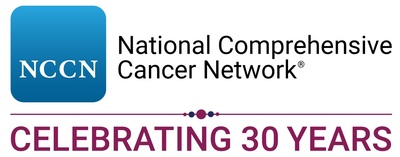New research from the Abramson Cancer Center at the University of Pennsylvania, published in the May 2019 issue of JNCCN—Journal of the National Comprehensive Cancer Network,
|
PLYMOUTH MEETING, Pa., May 23, 2019 /PRNewswire/ -- New research from the Abramson Cancer Center at the University of Pennsylvania, published in the May 2019 issue of JNCCN—Journal of the National Comprehensive Cancer Network, uses a large, real-world dataset to demonstrate there is a modest but consistent survival benefit associated with adding bevacizumab to carboplatin-pemetrexed when treating advanced non-squamous non-small cell lung cancer (NSCLC). This combination is already a common clinical practice, but there has never been a randomized prospective clinical trial to determine whether adding bevacizumab confers any survival benefit.
"Our results suggest that in patients with a contraindication to immunotherapy, such as connective tissue, rheumatologic, or interstitial lung disease, bevacizumab may be a reasonable alternative, instead of pembrolizumab, to add to carboplatin-pemetrexed," said lead author, Stephen J. Bagley, MD, MSCE, Assistant Professor of Hematology-Oncology, Abramson Cancer Center. "Many oncologists were already using carboplatin-pemetrexed-bevacizumab for patients with advanced non-squamous NSCLC, but this study suggests there is indeed an improvement in overall survival when bevacizumab is added. What's more, I was surprised to learn that the survival benefit of bevacizumab persisted even in older patients and after adjusting for brain metastases, hemoptysis, and anticoagulation use." The retrospective study used nationally representative electronic health record (EHR) data from Flatiron Health and supplemented these data with the researchers' institutional experience to account for confounding clinical variables not captured in the Flatiron database. These data cover a total of 4,724 lung cancer patients treated between January 1, 2011 and June 30, 2017 across more than 260 community cancer clinics. 2,759 patients (58%) received carboplatin/pemetrexed while 1,965 (42%) received carboplatin/pemetrexed/bevacizumab. The median overall survival improved to 12.1 months in the bevacizumab group versus 8.6 months without; even after adjusting for prognostic variables. In a second cohort including patients from Abramson Cancer Center, an academic institution, the overall survival benefit gain was even greater when bevacizumab was added. "Despite a lack of randomized clinical trial data, carboplatin and pemetrexed in combination with bevacizumab is a regimen that is used for treating naïve patients with advanced non-squamous NSCLC. Now, with the approval of immunotherapy-containing regimens, this therapeutic approach is reserved for those who are not candidates for immunotherapy," commented Ticiana Leal, MD, Assistant Professor of Medicine, University of Wisconsin Carbone Cancer Center. Dr. Leal is an associate editor for JNCCN and a member of the NCCN Clinical Practice Guidelines in Oncology (NCCN Guidelines®) Panel for Non-Small Cell Lung Cancer. "In the NCCN Guidelines®, this regimen is included as a category 2A recommendation. While the study is limited by its retrospective and non-randomized nature, potential cofounders, and lack of analysis for cost and toxicity burden, the analysis does provide additional support for the incorporation of bevacizumab in the treatment of advanced NSCLC for selected patients." To read the entire study, visit JNCCN.org. Complimentary access to "Comparative Effectiveness of Carboplatin-Pemetrexed With vs Without Bevacizumab for Advanced Non-Squamous Non-Small Cell Lung Cancer" is available until August 10, 2019. The issue also includes "Policy Challenges and Opportunities to Address Changing Paradigms in Cancer Care Delivery," written by an NCCN Policy working group. About JNCCN—Journal of the National Comprehensive Cancer Network About the National Comprehensive Cancer Network The NCCN Member Institutions are: Abramson Cancer Center at the University of Pennsylvania, Philadelphia, PA; Fred & Pamela Buffett Cancer Center, Omaha, NE; Case Comprehensive Cancer Center/University Hospitals Seidman Cancer Center and Cleveland Clinic Taussig Cancer Institute, Cleveland, OH; City of Hope National Medical Center, Duarte, CA; Dana-Farber/Brigham and Women's Cancer Center | Massachusetts General Hospital Cancer Center, Boston, MA; Duke Cancer Institute, Durham, NC; Fox Chase Cancer Center, Philadelphia, PA; Huntsman Cancer Institute at the University of Utah, Salt Lake City, UT; Fred Hutchinson Cancer Research Center/Seattle Cancer Care Alliance, Seattle, WA; The Sidney Kimmel Comprehensive Cancer Center at Johns Hopkins, Baltimore, MD; Robert H. Lurie Comprehensive Cancer Center of Northwestern University, Chicago, IL; Mayo Clinic Cancer Center, Phoenix/Scottsdale, AZ, Jacksonville, FL, and Rochester, MN; Memorial Sloan Kettering Cancer Center, New York, NY; Moffitt Cancer Center, Tampa, FL; The Ohio State University Comprehensive Cancer Center - James Cancer Hospital and Solove Research Institute, Columbus, OH; O'Neal Comprehensive Cancer Center at UAB, Birmingham, AL; Roswell Park Comprehensive Cancer Center, Buffalo, NY; Siteman Cancer Center at Barnes-Jewish Hospital and Washington University School of Medicine, St. Louis, MO; St. Jude Children's Research Hospital/The University of Tennessee Health Science Center, Memphis, TN; Stanford Cancer Institute, Stanford, CA; UC San Diego Moores Cancer Center, La Jolla, CA; UCSF Helen Diller Family Comprehensive Cancer Center, San Francisco, CA; University of Colorado Cancer Center, Aurora, CO; University of Michigan Rogel Cancer Center, Ann Arbor, MI; The University of Texas MD Anderson Cancer Center, Houston, TX; University of Wisconsin Carbone Cancer Center, Madison, WI; Vanderbilt-Ingram Cancer Center, Nashville, TN; and Yale Cancer Center/Smilow Cancer Hospital, New Haven, CT. Clinicians, visit NCCN.org. Patients and caregivers, visit NCCN.org/patients. Media, visit NCCN.org/news. Follow NCCN on Twitter @NCCN, Facebook @NCCNorg, and Instagram @NCCNorg. Media Contact:
SOURCE National Comprehensive Cancer Network |





